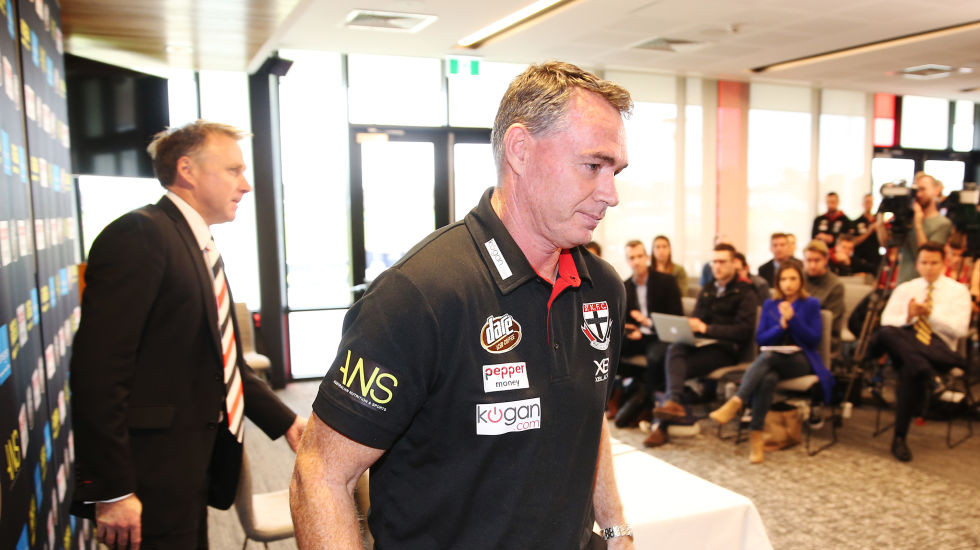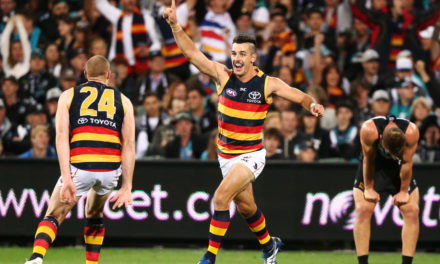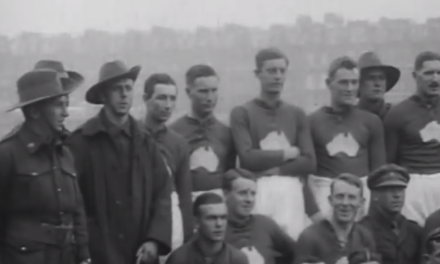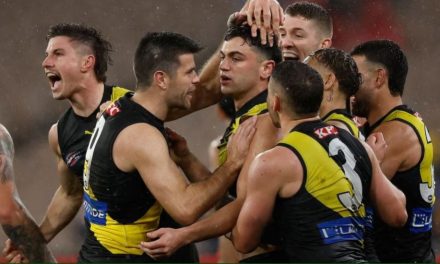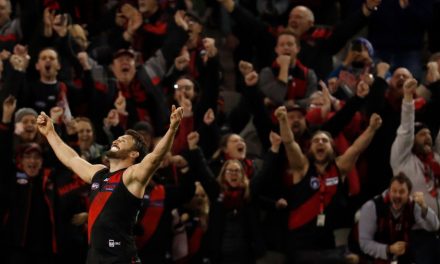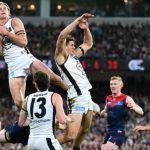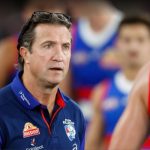Alan Richardson leaves the scene of his final press conference as St Kilda coach last Tuesday. Photo: GETTY IMAGES
AFL football can be an irrational and illogical business at times, one also prone to let pride get in the way. And sometimes when it comes to decisions which need the clearest of heads. Like the hiring and firing of coaches.
On Tuesday, the coaching ranks recorded a third 2019 casualty when St Kilda’s Alan Richardson fell on his sword, beating what had become an inevitable decision to replace him as the Saints’ coach for 2020.
Viewed in its entirety, Richardson’s record over six years didn’t present a convincing case for a reappointment.
He recently became St Kilda’s second-longest serving coach behind only Allan Jeans. But over six seasons under his stewardship, St Kilda hadn’t played finals and had won only 43 and drawn two of 126 games, for a winning strike rate of just 34 per cent.
They’re not great numbers, and on their own vindicate the club’s decision to look elsewhere. But it’s the timing of the change of direction which doesn’t stack up quite as neatly. And, not for the first time when it comes to coaches, isn’t a ringing endorsement of a club’s decision-making.
St Kilda had far more cause to be dispensing with Richardson’s services as coach at the end of last year than this one.
The Saints weren’t nearly as racked by injury, finishing about mid-table for games lost through injury to their best 22. They were coming off a year in which they’d gone at 50 per cent with 11 wins, only missing the top eight by a game. But 2018 was a shocker, reaping just four wins, a draw, and a finish of 16th.
The more significant issue, though, was that St Kilda had opted in October 2017 to extend the contract of Richardson (who was already signed until the end of 2018) by another two years, tying him up until the end of 2020.
To have moved him on less than 12 months after that would have been a considerable admission of error on one of the most important decisions a football club can make.
So, taking its cues from the reorganisation around the senior coach which worked so well for both Richmond in 2017 and Collingwood last year, St Kilda followed suit.
Veteran football man Graeme “Gubby” Allan came on board, along with a new list manager in James Gallagher. Former Tiger Jake Batchelor went from a part-time role to a full-time assistant coach. And the Saints brought in a couple of coaching heavy-hitters in former Carlton senior coach Brett Ratten and long-time assistant Brendon Lade.
What couldn’t be accounted for was the long list of key absentees with which St Kilda negotiated the start of this season.
It took in four-time best and fairest winner Jack Steven, battling mental health issues, star recruit Dan Hannebery, Dylan Roberton with a heart problem, key defender Jake Carlisle with a back injury, and key forward Paddy McCartin, who had on-going issues with repeated concussions.
Those five are not only members of St Kilda’s best 22, but in terms purely of talent, among their best dozen. That would have tested any club in the competition, let alone a still-young and inexperienced playing list like the Saints have.
And the injuries haven’t abated at any stage this season. Right now, there’s 14 players listed on the official injury list, Steven, Roberton and McCartin still there, along with skipper Jarryn Geary, Hannebery, and Jimmy Webster, who finished sixth in last year’s best and fairest.
Collectively, those seven players have appeared in just 23 of 112 possible games this season, or fractionally more than 20 per cent. Given that backdrop, St Kilda’s effort to win four of its first five games and sit second on the ladder was quite remarkable.
And while the Saints have won only two out of 11 since then, they have largely stayed at least competitive, again at Geelong last Saturday night, in the process expediting the development of the likes of Rowan Marshall, Hunter Clark and having woven mature-aged recruits like Dean Kent, Matt Parker and Nick Hind into the mix.
This hasn’t been a team which has turned up its toes. Despite the fact it appeared for some time like Richardson’s cards were already marked. Put those seven names back in there for an entire (or at least a fair chunk) of the season and who knows what might have happened under Richardson’s watch next year?
As a coaching effort, given the obstacles in the way, what he’s achieved in 2019 has to be at the bare minimum a pass. And the trajectory of his first four years in charge reads four and six wins, 12 wins (missing finals on percentage) and 11 wins (missing finals by a game), before the downturn of 2018.
Viewed on a year by year basis, that’s one strike only in six “at bats”. So why wasn’t the club as compelled to act immediately after that strike as 12 months subsequently?
Surely, the answer is pride. There’s no doubt St Kilda as a club, and no doubt the football department as a group probably over-estimated its abilities at the end of 2017, intoxicated by that famous round 16 demolition of premiership aspirant Richmond, after which it sat seventh on the ladder at 9-6.
It encouraged the Saints to call time on the likes of Nick Riewoldt and Leigh Montagna, in hindsight too hastily. Since that evening, St Kilda has won just 12 of 45 games. But should that decision be on the coach’s head, or on an entire club’s?
And having had enough confidence in Richardson to extend him by another two years beyond the one more he was contracted for after the 2017 season, is there not some sort of obligation in the absence of disaster (which there hasn’t been) to allow him to see it out?
No. Because this is football. And in its passionate, emotional and often knee-jerk atmosphere, there’s little that happens which can’t be rationalised, justified, or handballed to somebody else.
St Kilda is about to assemble a group to select its replacement coach for Richardson. It has a wide range of choices available, men who have already coached at senior level like newly-installed caretaker Ratten or former Brisbane coach Michael Voss.
There’s the usual ranks of current assistant coaches, including a couple who have recently also stepped into caretaker roles with success, Rhyce Shaw and David Teague.
Names thrown up to be part of the coaching selection panel include former St Kilda coach Grant Thomas and the recently-retired Riewoldt. Club ties count for much in these situations, demonstrated again recently in North Melbourne’s interest in its former full-forward and Sydney premiership coach John Longmire to “come home”.
St Kilda people like Thomas and Riewoldt know the culture and workings of the club back-to-front. Is that a good thing? Possibly. Or would it just help perpetuate the same deficiencies which have made the club, historically, a struggler for so long? Well, that’s possible, too.
And does an assistant coach at Collingwood in Robert Harvey become a firmer candidate for the St Kilda job because he was one of the club’s greatest players? Most likely.
What we know for certain is that if the eventual new coach is from “outside” the tent, his success will be attributed to having brought a fresh perspective to the place, just as his failure will doubtless be blamed upon a lack of familiarity with the particular quirks of life at Moorabbin.
If it’s Harvey, Ratten (now having been at the club nearly a year) or even one out of left-field, like Ross Lyon returning to the scene of past triumphs, wins will be “because they know what makes the place tick”, and losses because “they were too close to the place”.
The narrative will be shaped to fit the circumstances, as it has been once again with Richardson. Because when it comes to coaching, no appointment, nor sacking for that matter, is any more than a calculated punt. And when you need to rationalise it, logic can and will often take a back seat.
*This article first appeared at INKL.

